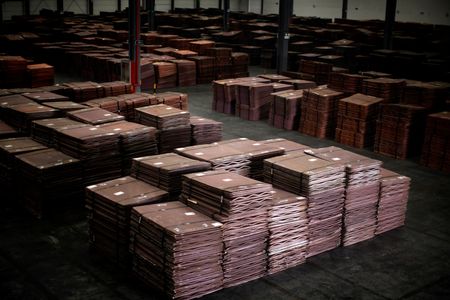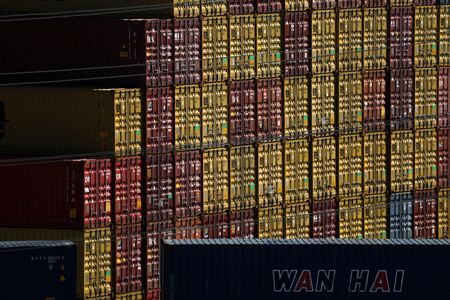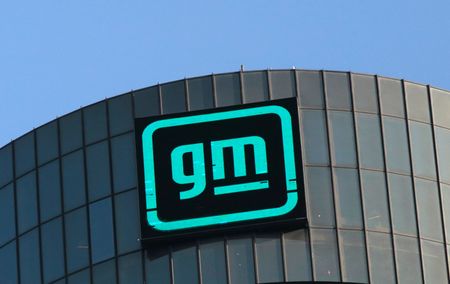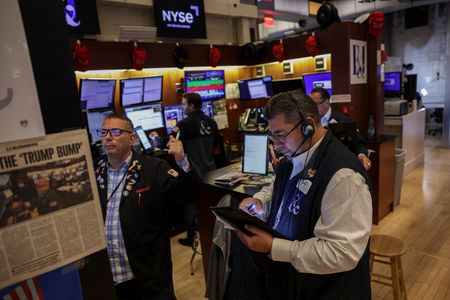By Suzanne McGee, Saeed Azhar, Tom Westbrook and Marc Jones
LONDON/SINGAPORE/NEW YORK (Reuters) -The only certainty about Donald Trump’s second U.S. Presidency looked to be uncertainty for investors, after he went easier than expected on China in his first day back in the job but then warned Mexico and Canada they faced 25% tariffs from next month.
Chinese markets were relieved after Beijing avoided an instant blizzard of executive orders but Mexico’s peso and Canada’s dollar weren’t so lucky as Trump’s off-the-cuff talk about tariffs on both countries from Feb.
1 ensured their currencies both took a tumble. [/FRX]
After his inauguration on Monday, Trump also floated the idea of universal tariffs, but said the U.S. was not ready for that yet.
“Uncertainty has been the name of the game since the election result,” said Michael Reynolds, vice president of investment strategy at Glenmede.
“The rubber is now starting to hit the road, we’re getting more certainty but not complete certainty yet,” he said.
The dollar rallied on Tuesday after plunging during the inauguration, with the tariff warning pushing it to a five-year high against its Canadian counterpart, a rebound that also pushed the euro and pound down in Europe.
[MKTS/GLOB][FRX/]
Wall Street’s first reaction, having been closed for a public holiday on Monday, was a 0.5% rise on the S&P 500 as traders stuck to the view the returning president’s “America first” mantra would boost corporate profits.
[.N]
Trump also said he wanted to reverse the U.S. trade deficit with the European Union, either with tariffs or more energy exports.
Mexico and Canada are the most exposed though. The United States imported around $475 billion worth of goods from the former and $418 billion from the latter last year.
Nigel Green, CEO of the deVere financial advisory group, said that was 30% of all U.S.
imports, meaning the consequences of 25% tariffs “could be seismic”.
Asian investors saw China’s yuan and Hong Kong shares push higher on Tuesday. Battery and wind energy stocks dropped though after Trump confirmed he was reversing green energy policies and pulling the U.S.
out of the Paris climate accord.
One of JPMorgan’s top bankers told a panel at the Davos World Economic Forum that her colleagues have set up a “war room” and had worked through the night to be on top of Trump’s moves.
“The last 24 hours are showing that there’s going to be a lot of changes that we all have to digest,” Mary Callahan Erdoes, the bank’s head of asset and wealth management, said.
Also speaking in Davos, China’s vice premier Ding Xuexiang, gave his response.
“Protectionism leads to nowhere,” he said. “And there are no winners in a trade war.”
An aggressive round of U.S. tariffs – where they exceed current assumptions – could drive economies from Canada to Europe into recession.
The unpredictability of U.S. policies, however, is not deterring all investors.
“We are active managers so for us this is a great environment, we like uncertainty and we like volatility as it gives us opportunities,” Konstantin Veit, a European portfolio manager at bond giant PIMCO, said.
PIMCO expects the negative impact of tariffs to drive down interest rates in Europe and elsewhere but could also push U.S.
Treasury yields back to a juicy and attractive 5%.
OVERHANG
Trump had vowed to immediately impose steep tariffs of 10% to 20% on global imports into the U.S. and 60% on goods from China, but a memo he issued after taking office only directed agencies to research and investigate the U.S.
trade deficits.
“There was an expectation that he was just going to do an executive order and hit it hard, and he didn’t,” said Walter Todd, chief investment officer at Greenwood Capital.
The dollar hit a five-year high of 1.452 Canadian dollars before steadying around C$1.43.
It rose but stayed below last month’s highs on the Mexican peso and volatility gauges for both stocks and the most directly impacted currencies remained well below their November U.S. election levels.
Treasuries rallied, while MSCI’s 47-country world share index, which has more than doubled in value since Trump’s 2016 election win and is now worth nearly $80 trillion, was up about 0.5%.
“Most of what he (Trump) has been talking about will help spur growth and corporate profits,” said Jack Ablin, chief investment officer at Cresset Capital.
“But many will come at a cost. We will need to see a lot of earnings growth to make up for even a minor increase in interest rates that could follow higher tariffs” and other proposals, he said.
PRO-BUSINESS, BUT AT A COST
Trump enters office with an ambitious agenda spanning trade, immigration, tax cuts and deregulation which has the potential to boost U.S.
corporate profits. But it could also fan inflation and force the Fed into a rethink on U.S. interest rates.
A BofA survey of global fund managers published on Tuesday showed investors were bullish on the dollar and U.S.
stocks, but had their most bearish views on bonds since October 2022.
In his inaugural speech, Trump pledged to bolster the U.S. oil, gas and power industries and to crack down on immigration.
Cryptocurrency markets, which soared in the run-up to Trump taking office, stalled as the lack of any instant crypto-friendly announcements stirred some disappointment.
Bitcoin, which came close to $110,000 on Monday, was trading around the $105,000 mark and a Trump-branded meme coin that hit almost $75 on the weekend fell to $39.
During the first year of Trump’s first administration, the S&P 500 rose 19.4%, following a 5% rally in his first 100 days.
For the entirety of his first term, the S&P 500 rose nearly 68%, but saw bouts of volatility, stemming in part from a trade war he fought with China.
“The big question on investors’ minds right now is going to be ‘how’ — how will he cut costs and lower inflation and lower interest rates,” said Josh Strange, president of Good Life Financial Advisors of NoVA, a financial advisory firm.
(Reporting by Marc Jones, Suzanne McGee, Karin I.
Strohecker, Saeed Azhar and Gertrude Chavez, Lewis Krauskopf, Davide Barbuscia; Editing by Lisa Shumaker, Deepa Babington, David Gregorio, Jacqueline Wong, Shri Navaratnam and Susan Fenton)











